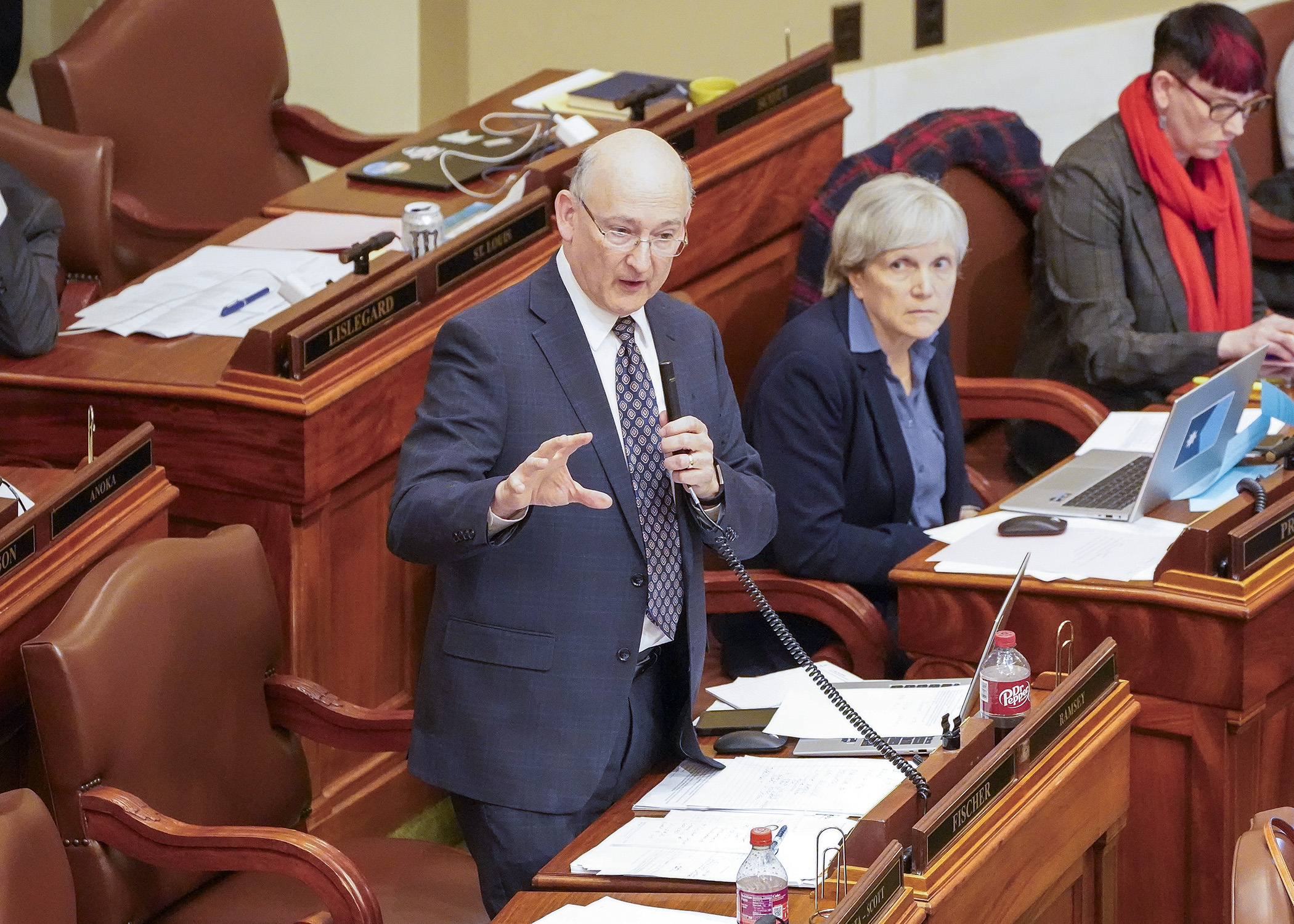House passes human services policy bill that would end subminimum wage program

People with a disability who legally earn less than minimum wage under a federal program would see that program end under a bill hotly debated Monday.
Amended to include the House language, HF4392/SF4399* was passed 69-62 and sent back to the Senate where its version was passed 59-9 April 4.
Among its provisions, the bill would phase out the special minimum wage program for people with disabilities, which some refer to as “subminimum wage.” Employers would not be allowed to hire for less than minimum wage beginning Aug. 1, 2026, and would have to pay all existing employees with disabilities the relevant minimum wage by Aug. 1, 2028.
Rep. Peter Fischer (DFL-Maplewood), the bill sponsor, said the average wage across the program is $4.15, but he has been told of an individual making 7 cents an hour. “We can do better than that,” he said.
The House voted against an amendment that would have left the special minimum wage provision in place, offered by Rep. Debra Kiel (R-Crookston).
“Stripping a choice from those people would be one of the most difficult and challenging things that this Legislature could do,” said Rep. Isaac Schultz (R-Elmdale Township). “We need to lean into providing more opportunities, to enhance the quality of life for every Minnesotan who is living with a disability.”
In other areas of disability services, the bill would reduce the burden for those receiving Medical Assistance for Employed Persons with Disabilities by requiring recipients to qualify once each year. Presently, they must qualify twice each year.
Substance Use Disorder Services
Several bill provisions would clarify substance use disorder statutes.
Service providers for adults could qualify to receive higher reimbursement rates for providing on- or off-site child care during treatment hours or for offering culturally responsive programs, disability responsive programs, medical services, or services for individuals with co-occurring mental health and substance use disorders.
The bill would change the definition of peer recovery support services to denote that peers serve as mentors or recovery-support partners for individuals in recovery, and may provide encouragement, accounts of their own recovery, transportation to appointments, and assistance identifying resources for housing, employment, and support groups.
Recovery peers would have to be classified as employees rather than independent contractors. Recovery community organizations eligible as peer support vendors would have to be certified by — not just members of — an accrediting organization.
Sober home requirements would be modified to allow residents to use legally prescribed drugs for the treatment of opioid use disorder and other medications to treat co-occurring substance use disorders and mental health conditions.
The bill would also require sober homes to keep opiate antagonists such as naloxone or naltrexone in a conspicuous location to prevent opiate overdose. An amendment offered by Rep. Dave Baker (R-Willmar) to push back the effective date to June 1, 2026, to allow sober homes to prepare for the new requirements, was adopted.
The bill would also modify what a practitioner must review and document before dispensing treatment doses to patients for their unsupervised use on one weekend day, state and federal holidays, and days the client’s clinic is closed.
Aging Services
Individuals in assisted living facilities are now counseled on long-term care options so they may make informed choices. The bill would expand that provision to individuals across all critical care spectrums.
The bill would also provide for continuity of care for seniors receiving personal assistance and transitioning onto the medical assistance elderly waiver program.
Community residential settings serving up to six individuals would be exempt from rental licensing regulations imposed by any town, municipality, or county.
Deaf, DeafBlind, and Hard of Hearing Services
The bill would modify the makeup of the Commission of the Deaf, DeafBlind, & Hard of Hearing by increasing the number of at-large members from seven to 10, and voting members could not serve more than three consecutive full terms. The bill would limit advisory committee members to three consecutive terms and no more than nine years in total.
Other unsuccessfully offered Republican amendments would have:
- required the Department of Human Services, within available appropriations, to develop and implement a uniform outcome measurement and reporting system for homeless shelters and supportive services; and
- changed the definition of a new American from an individual born abroad and their children, irrespective of immigration status, to an individual born abroad and their children who have legal immigration status, in relation to legal, social services, and long-term care workforce grant program for organizations that serve and support new Americans.
Related Articles
Search Session Daily
Advanced Search OptionsPriority Dailies
Speaker Emerita Melissa Hortman, husband killed in attack
By HPIS Staff House Speaker Emerita Melissa Hortman (DFL-Brooklyn Park) and her husband, Mark, were fatally shot in their home early Saturday morning.
Gov. Tim Walz announced the news dur...
House Speaker Emerita Melissa Hortman (DFL-Brooklyn Park) and her husband, Mark, were fatally shot in their home early Saturday morning.
Gov. Tim Walz announced the news dur...
Lawmakers deliver budget bills to governor's desk in one-day special session
By Mike Cook About that talk of needing all 21 hours left in a legislative day to complete a special session?
House members were more than up to the challenge Monday. Beginning at 10 a.m...
About that talk of needing all 21 hours left in a legislative day to complete a special session?
House members were more than up to the challenge Monday. Beginning at 10 a.m...